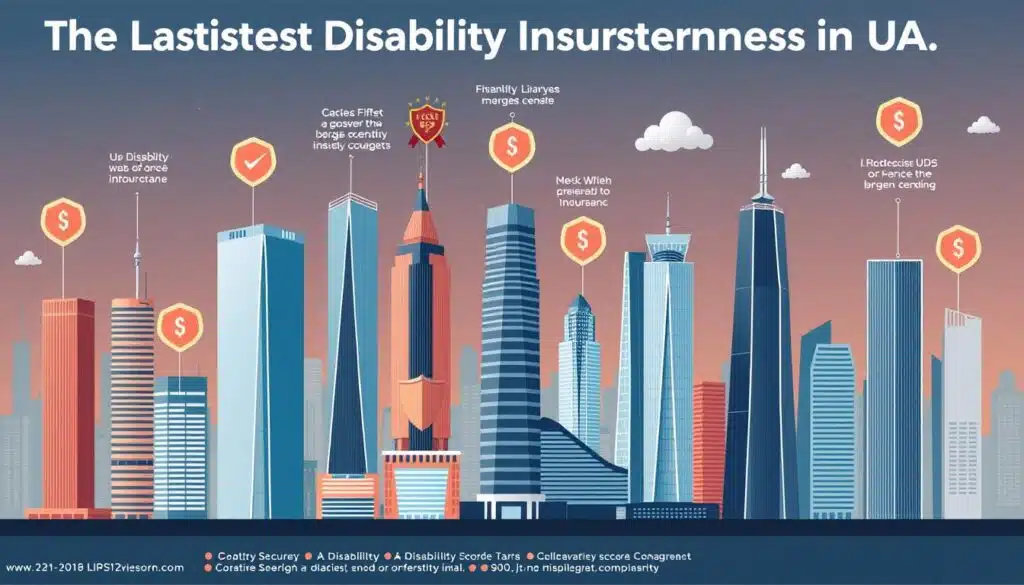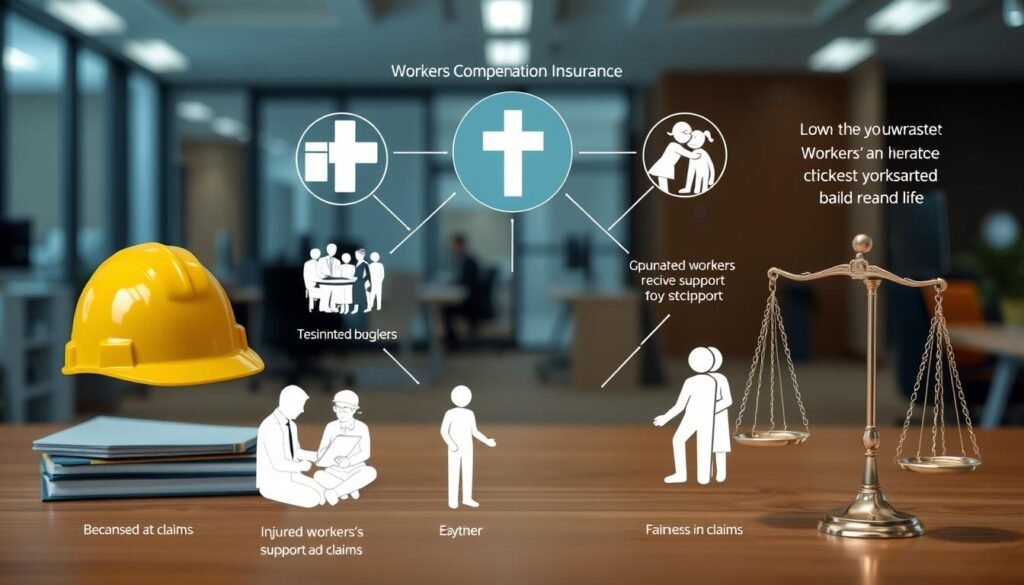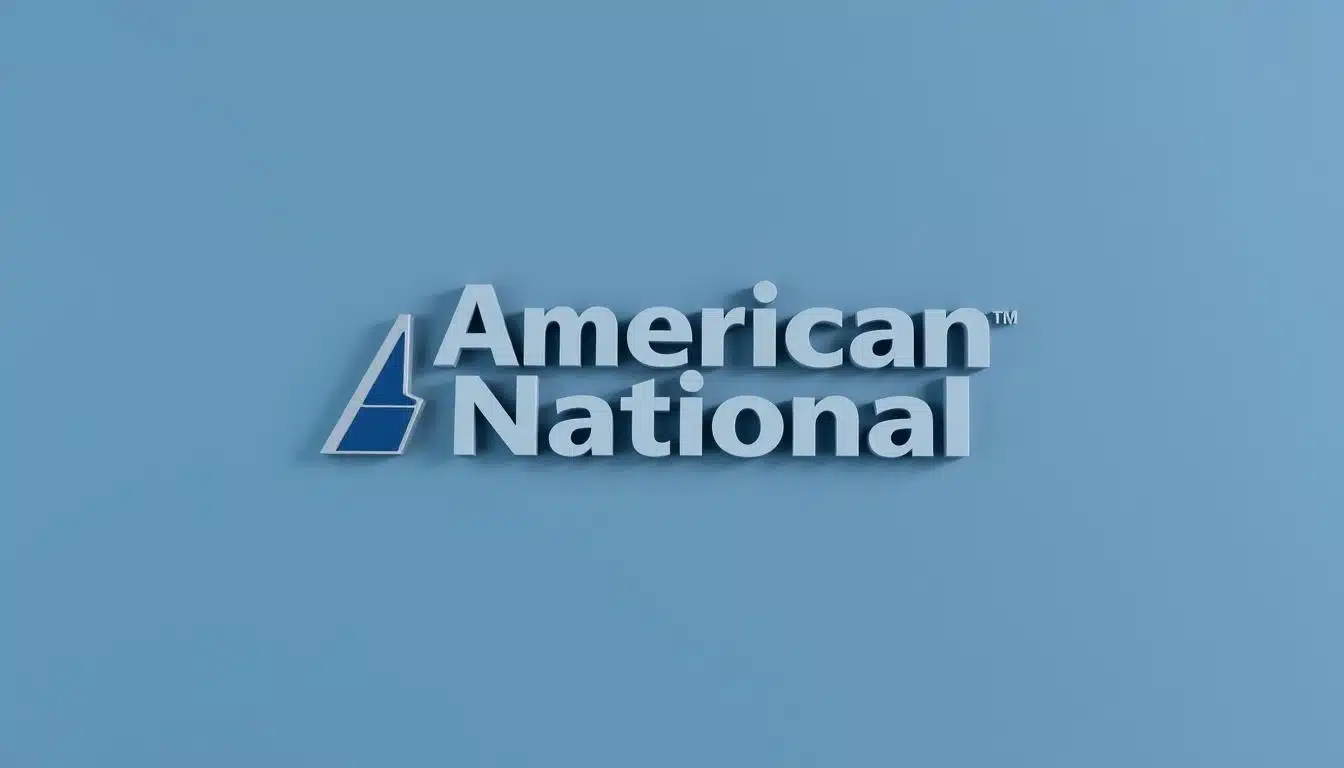Looking for the biggest disability insurance companies is key to feeling secure when life gets tough. Millions rely on good coverage, but worries about being denied or facing hard claims processes are real. Big names like CIGNA and Unum have had their reputations hit by scandals.
Finding the best and largest disability insurance companies is crucial. We’ll look at their good points and problems. This will help you choose wisely for your future.
Table of Contents
TogglePoints to be noted;
- CIGNA is recognized as the largest disability insurance provider in the U.S.
- Unum has faced legal challenges and settlements impacting their credibility.
- MetLife has a notable history of litigation regarding claims practices.
- Customer feedback reveals variances in claims processing among leading companies.
- Understanding each company’s policies is critical for making informed decisions.
Overview of Disability Insurance
Disability insurance is key for those who might not work because of illness or injury. It acts as a safety net, replacing lost income. This helps people keep their standard of living when times are tough.
There are two main types: short-term and long-term disability insurance. Short-term covers about 60% of income and starts quickly, often in 14 days. Long-term offers coverage for months to years, helping those who can’t work for a long time.
Up to 43% of people aged 40 might face long-term disability by 65. Disability income insurance can replace 45% to 65% of income when you can’t work. This is a big help during hard times.
Policies often have a 90-day waiting period before you start getting benefits. Premiums can be from 1% to 3% of your income, based on age and job. Women might pay more because of pregnancy and health issues. Some states, like California and New Jersey, require disability income plans, showing a push for better coverage.
The world of disability coverage is changing, with more people choosing voluntary insurance. It’s important to check your policy well. Make sure it fits your needs.
What is Long-Term Disability?
Long-term disability insurance helps people who can’t work for a long time because of illness or injury. It gives financial support to keep their lifestyle going during tough times.
About one in four people who are 20 today will become disabled before they retire. This shows how important long-term disability insurance is. The average monthly Social Security Disability Insurance benefit is $1,483. This is often less than what most people make each month.
Long-term disability insurance can cover up to 60 percent of your income. For example, Assurity offers benefits up to $6,000 monthly for those aged 18 to 55. How much coverage you need depends on your income, savings, and expenses.
Many people get long-term disability from chronic health issues, mental illnesses, or accidents. It’s key to know what your policy covers, like waiting periods and how long benefits last. This helps with financial planning and keeps your money safe during hard times.
Having long-term disability insurance can give you peace of mind. It means your income will keep coming even when you can’t work. With the right coverage, you can heal without worrying about money.
Top 10 Largest Disability Insurance Companies
When looking for disability insurance, people want the best. They look for companies known for being financially strong and making customers happy. The top names for doctors are Ameritas, Guardian, MassMutual, Principal, and The Standard. These are the most trusted names in disability insurance.
Doctors often pick a 90-day wait before their insurance kicks in. The benefits last until they’re 65 or 67. The monthly pay can go from $5,000 for residents to over $30,000 for full doctors.
It’s also key for doctors to have true own occupation coverage. This means they get help when they can’t do their doctor work. All the top companies offer this.
The Standard is special because it has a family care benefit. This helps doctors with family needs. Principal is unique too, with a Transitional Own Occupation Rider. This lets doctors get benefits while starting new careers.
Looking at money, ratings are important. MassMutual has a top rating of A++ (Superior) from AM Best. Guardian also has a high rating. These ratings show the financial strength of these companies, making people feel safe with their choices.
With great features, financial strength, and happy customers, picking the best insurance is easier. People can make smart choices from the top companies.
CIGNA: The Largest Disability Insurance Company
CIGNA is the biggest disability insurance company in the U.S. It shows a strong presence in the market. It offers wide coverage options, making it a top choice for many.
Key Benefits and Offerings
CIGNA has many benefits, like coverage for different needs. It also offers new services like telehealth and wellness programs. In 2023, CIGNA made US$195.3 billion in revenue and US$8.536 billion in operating income.
Claims Process and Customer Experiences
CIGNA’s claims process has faced criticism. Some say it’s not always fair. People like the coverage but find claims hard after a 24-month rule change.
After 24 months, proving you can’t work in any job is needed. This makes it harder to get claims approved.
CIGNA had to pay $77 million to settle denied claims. This shows how important it is to know their claims process. Some say CIGNA uses unfair methods like surveillance.
Unum: A Leading Disability Insurance Provider
Unum is a top name in disability insurance. It offers many insurance products for both people and businesses. These options help employees feel secure when unexpected things happen.
Historical Background and Practices
Unum has been a key player in disability insurance for a long time. In the mid-2000s, it faced lawsuits that made it change how it handles claims. Now, it helps over 36 million people and their families, working with 57% of Fortune 100 companies.
Unum has made big changes to help people with illnesses like pregnancy, cancer, and heart disease.
Insurance Products Available
Unum has Short Term and Long Term Disability insurance. These can replace up to 60% of what you earn. Almost half of U.S. workers could only last two months without work.
Unum’s Individual Disability Insurance is great for those who earn a lot. It offers flexible and portable coverage. It also has special plans that mix Long Term and Individual Disability insurances, fitting different groups of employees.
What’s more, Unum’s Individual Disability Insurance is portable. This means you can keep your coverage even if you change jobs.
| Insurance Product | Coverage Type | Benefit Payments | Portability | Common Uses |
|---|---|---|---|---|
| Short Term Disability | Group & Individual | Up to 60% of income | Sometimes Portable | Pregnancy, joint disorders, respiratory issues |
| Long Term Disability | Group & Individual | Up to 60% of income | Sometimes Portable | Cancer, back disorders, cardiovascular disease |
| Individual Disability Insurance | Individual | Varies; up to 100% portable | 100% Portable | High-income professionals seeking additional coverage |
Unum offers a wide range of products. It shows its dedication to helping different professionals stay financially stable during tough times.
MetLife: Fortune 500 Leader in Disability Coverage
MetLife is a top name in disability insurance. It’s a Fortune 500 company known for its wide coverage. In 2024, it was named one of the 100 Best Companies to Work For by Fortune magazine. This shows MetLife cares about its employees, with over 90% proud to work there.
MetLife is also a great place to work globally. It has earned this title in many countries. This shows it’s a company that values its employees worldwide.
MetLife made $66,905 million in 2024, down 4.3% from last year. Its profits were $1,578 million, down 37.9%. But, its market value is still high at $52,929 million. It also employs about 45,000 people, helping the economy.
MetLife’s workforce is diverse. It has 13% African-American/Black, 11% Asian, 64% Caucasian/White, and 8% Hispanic/Latino employees. The company offers disability insurance and covers 80% of health care for its employees. This makes it a top choice for reliable disability coverage.
The Hartford: Navigating Claims Are Challenging
Hartford disability insurance is known for its good and bad sides. Many find it hard to get through the claims process. They face delays in getting their claims approved, which is very frustrating.
Customers are unhappy because they want quick help and answers. They feel Hartford doesn’t listen to them fast enough.
Customer Service and Response Time
Customer service at Hartford is a big worry. People give it low scores for being slow with payments. They also say it’s hard to get help with claims.
This shows many problems are not fixed. The overall service rating is very low, which is a big concern. People think if Hartford was faster, things would get better.
As more people share their experiences, Hartford needs to think about how to do better. They need to make sure customers are happy and get the help they need.
“Inconsistent customer service can lead to greater challenges in claims processes, urging a need for improved protocols.”
Lincoln Financial Group: Reputation and Practices
Lincoln Financial Group is a big name in disability insurance, covering over two million workers in the U.S. It’s known for its financial strength and wide range of products. But, it has faced legal battles over its claims practices.
Lincoln Financial boasts about its financial health. Yet, it has been sued many times for denying claims unfairly and taking too long to process them. Customers are unhappy, giving it a 1.6 out of 5 rating from 95 reviews. Shockingly, 0% of reviewers would suggest Lincoln Financial.
Many policyholders have trouble with their claims. The rating for handling claims is just 1.9 out of 5. Getting paid on time is also a problem, with a rating of 2.0 out of 5.
Real-life stories show the company’s challenges. One person had trouble getting disability benefits during maternity leave. Another was ignored by Lincoln Financial, making mental health issues worse. These stories stress the need to carefully choose disability insurance.
Prudential: Issues with Claims Denials

Prudential disability insurance has both good and bad points, especially with claims denials. It’s a big name in insurance, but its claim history worries many. Many claims are first denied, leading to lawsuits against unfair decisions.
Litigation History and Consumer Feedback
Prudential is the biggest insurance company in the U.S. and a major group life insurance provider. But, its claims process has a dark side. Most lawsuits against Prudential’s disability claims denials are under ERISA.
Policyholders face big hurdles in appealing denied claims. Many say Prudential’s denial practices are unfair, causing distrust.
Prudential denies claims first to avoid paying out, as they only pay if a court orders them to. This has led to claims of unfair practices, as Prudential plays multiple roles.
People are unhappy with how Prudential handles claims. Robinson Warncke has won over $100 million for clients against Prudential, showing deep problems in claims handling. Prudential sets a 180-day appeal deadline, and policies often have a three-year limit for claims.
Juries have awarded bad faith damages into the millions of dollars, though such occurrences are relatively rare. The stakes are high in ensuring that claims processes are navigated effectively.
Knowing these facts helps people think twice about Prudential’s insurance.
Reliance Standard: A Nationwide Player in Disability Insurance
Reliance Standard is a big name in disability insurance in the U.S. They offer many products to meet different needs. But, they’ve faced issues with how they handle claims, especially with claims they deny unfairly.
Reliance Standard conducts in-house nurse reviews to initially assess disability claims. People say the company’s denials are unclear. They often say the claimant doesn’t meet the policy’s disability criteria.
The pre-suit appeal process is very important when dealing with Reliance Standard. During this time, the company might ask for more medical tests. This can make people worry about fairness in how claims are handled.
Reliance Standard doesn’t share the report from these medical tests until after they deny an appeal. This has raised concerns with groups like the Department of Labor (DOL).
Since 2018, there’s been a push for more openness in how claims are handled. Now, insurers must give claimants all new evidence before making a final decision. Getting legal help is often advised for those with denied claims.
Reliance Standard also gets criticized for how they handle Social Security Disability (SSDI) benefits. For example, they cut a client’s benefits by nearly $2,000 a month.
Even after the client provided proof for SSDI, Reliance Standard wanted more verification. This made the client very upset. The company only starts paying back benefits for future months, not for the months they already took.
Many people are unhappy with Reliance Standard. They have given the company a low rating of 1.6 out of 5 stars. People have complained about late payments, unclear claims handling, and poor customer service.
Liberty Mutual: The Good and the Bad
Liberty Mutual is a big name in insurance, but it gets mixed reviews. It’s especially important to know about trust in long-term disability (LTD) benefits. The company is ranked as the tenth worst in the U.S. by the American Association for Justice.
In 2018, Liberty Mutual made $41.6 billion, making it the fifth-largest insurer. But, many customers are unhappy with their service. They say it’s hard to get claims approved and payments delayed.
Consumer Trust and Claims Handling
How a company handles claims can really affect trust. Liberty Mutual is accused of denying valid claims. They might ask for too much medical info or say you had a problem before you got insurance.
This can cause big financial problems. If you’re denied LTD benefits, you can appeal or even sue if Liberty Mutual is unfair. Despite this, Liberty Mutual is seen as strong financially. It even gets good marks for handling auto claims, with a score of 717 out of 1,000 from J.D. Power.
In short, Liberty Mutual offers many insurance options and even has a cool program called RightTrack. But, how it handles claims is a big issue for trust. It’s key to know both the good and bad when choosing disability insurance.
Mutual of Omaha: Long-Term and Short-Term Insurance

Mutual of Omaha has many disability insurance options. They offer Mutual Income Solutions. This lets people get up to 70% of their income after a disabling event, up to $20,000 a month.
Their policies are flexible. This is great because 43% of 40-year-olds will have a disabling event by age 65.
Notable Cases and Customer Reviews
There have been cases that show how Mutual of Omaha handles claims. Wrongful denials have gotten a lot of attention. It’s important to know what your policy doesn’t cover.
Customers have mixed feelings about their experiences. Some are happy, while others are not. These stories can help others understand what to expect.
Some things that might not be covered include injuries you cause yourself, military service, or being drunk. People have had different experiences with short-term insurance claims. It’s similar to long-term policies in terms of satisfaction.
Comparison Table
A detailed comparison table shows key facts about the biggest disability insurance companies in the U.S. It helps people see important details like how much they pay each year, the company’s size, and what others say about it. This info is key for making smart choices about insurance.
A side-by-side comparison of key metrics (e.g., annual premiums, market share, customer ratings).
| Company | Annual Premiums (USD) | Market Share (%) | Customer Ratings (out of 5) |
|---|---|---|---|
| MetLife, Inc. | $39.30 billion | 15 | 4.5 |
| Allianz SE | $30.00 billion | 13 | 4.3 |
| AXA SA | $29.50 billion | 12 | 4.2 |
| The Hartford | $23.50 billion | 10 | 4.1 |
| CIGNA | $22.00 billion | 9 | 4.0 |
| Unum | $21.00 billion | 8 | 3.8 |
| Prudential | $19.00 billion | 7 | 3.7 |
| Lincoln Financial Group | $17.00 billion | 5 | 3.6 |
| Reliance Standard | $16.00 billion | 4 | 3.5 |
| Liberty Mutual | $15.00 billion | 3 | 3.4 |
The global disability insurance market was worth $3.30 billion in 2021. It’s expected to grow to $9.2 billion by 2031, with a 11.2% growth rate. In 2021, North America led the market, thanks to employer-provided insurance.
In 2020, new sales for individual disability insurance went down. But, life insurance sales rose by nearly 20% in 2021. Over 50 million working adults in the U.S. don’t have private disability insurance. This shows a big need for it.
How to Choose the Best Disability Insurance Company for You
Choosing disability insurance needs careful thought. Look at coverage, cost, and the company’s reputation. This helps you pick the right one for you.
Factors to consider (coverage options, cost, reputation, etc.).
- Coverage options: Check the types of coverage, like long-term and short-term. Each has its own benefits and rules.
- Cost: Disability insurance costs about 1% to 3% of your income. Think about how the benefit amount and waiting period affect your premium.
- Reputation: Look into the company’s history, what clients say, and their financial ratings. This shows if they’re reliable and trustworthy.
Importance of customer service, claims support, and financial stability.
Good customer service is key. You want a company that helps with claims and answers your questions. Also, check if the company is financially stable. Look for high ratings from AM Best and the Better Business Bureau.
By looking at these important points, you can make a smart choice. Evaluating your options well helps you get the right coverage. This gives you financial security and peace of mind.
Conclusion
This conclusion wraps up what we’ve learned about the biggest disability insurance companies in the U.S. We talked about CIGNA, Unum, and MetLife. They offer great coverage and are big players in the market. They help a lot of people who can’t work because of illness or injury.
Did you know 25% of U.S. workers aged 20-50 will get a disability before they retire? This shows how important it is to have this kind of insurance.
Concluding Points
The top 10 companies vary a lot. They differ in how they handle claims, what they offer in policies, and how happy their customers are. Most workers think all employers should have disability insurance.
Also, 69% of employers pay for Individual Disability Insurance (IDI) for their workers. This can help policyholders when they’re looking at their options.
Final Conclusion about disability insurance
When looking for disability insurance, it’s important to think about each company’s reputation and how they handle claims. Also, how much support they offer is key. Many people with long-term disabilities say their insurance helped them feel more stable during hard times.
Finally, talking to insurance experts can help a lot. They can give you the information you need to make a smart choice. This can help you find the right coverage for your needs.








